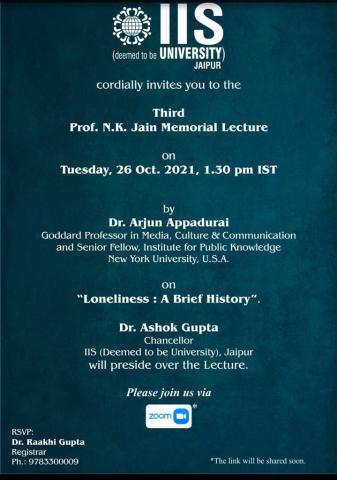Third Prof. N.K. Jain Memorial Lecture by Dr. Arjun Appadurai

The Department of English organized the Third Prof. N.K. Jain Memorial lecture (virtual) on 26 October 2020 on the topic ‘Loneliness: A Brief History’. Dr. Arjun Appadurai, a Goddard Professor in Media, Culture and Communication (Emeritus) at New York University and a Senior Fellow at the Institute for Public Knowledge was invited for the same. The virtual session began as Dr. Rimika Singhvi, Head of the Department of English, welcomed the distinguished guests, speaker, attendees and family members of Late Prof. Jain. Following this, Dr. Ashok Gupta, Chancellor, IIS deemed to be University, gave the introductory note and shared that Prof. Jain’s professorial legacy is an indispensable aspect of history of IISU. Dr. Raakhi Gupta, Registrar, then formally introduced the audience to Dr. Appadurai’s plethora of academic achievements and recognitions worldwide.
Prof. Appadurai began the lecture by addressing the orienting concern of ‘loneliness’ being a modern invention and how is it different from solitude. Through the reference of Eden Gardens, he pointed out the history and the variance of it in degree of intensity, culturally permissible expression and its classification as a malady. He explained it as a marking landscape of historical events which depends on culture-specific context. He, then, expounded on Michel Foucault’s theory of three solitudes, in prisons, monasteries, and clinics, and how it was generalized by COVID-19; how the masses were to enact norms of sociality in confinement. From loneliness and solitude, the lecture then moved on to ‘isolation’ the history of which is shadowed by stigma but has now become a requirement for social functionality.
Prof. Appadurai opined that the literary study of 'solitude' in European Romanticism is cloudy. Citing William Wordsworth, he stressed that contemplation in the company of Nature - providing utopia to urban solitude - was the core of the aesthetic experience for the Romantics, thereby, keeping true loneliness at bay.
The resource person further elaborated that new trend in literature could be seen due to COVID-19, especially in terms of death, nature and bereavement being tied together in a single frame. This was followed by the accentuation on 'solitude' being a venerable part of the Christian life, looked upon as the road to God since Antiquity as can be seen in writings of the Catholic writers. Thus, the English Romantics were not the first to chew over the concept of 'solitude.'
Making a brief detour into Sociology, Prof. Appadurai explicated how Net and iCloud contribute to 'electronic sublime’. He, then, elucidated that twenty-first century political leaders like Modi and Trump have proven that massification arises as a result of Totalitarianism and not of Democracy, as was assumed earlier.
According to him, massification was seen as an enemy of the core American values. By referring to The Lonely Crowd (1950) by David Riesman, Nathan Glazer, and Reuel Denney and The Organization Man (1956) by William H. Whyte, he illustrated how crowd itself can produce a form of loneliness. Furthermore, having referred to Gustave Le Bon, Prof. Appadurai suggested that massification was seen as the underbelly of Democracy.
The idea of image becoming a dominant currency in politics goes back to John F. Kennedy in the 1950s in the USA. However, this stands in stark contrast to the presidency of Donald Trump with whom came the death of curating such an image and whose behavior and that of his followers paradoxically substantiates a deep contempt for the social itself.
Additionally, the digital world in relation to 'loneliness' was examined. Though having tremendous potential for new kinds of social movements, it cannot be overlooked that it leads to shrinkage of space in terms of body-to-body intimacy, friendship and even pleasure. The world of apps is turning historical sociality into raw material, thus, making sociality itself an exploitable resource. Prof. Appadurai stated that it is the biggest potential threat to solitude as a pleasant experience.
After these relatively recent reflections, the Q/A session began which explored vast inter-disciplinary discussions. There were queries on how loneliness can be perceived as a post-humanist view & the loss and proliferation of ‘meaning’. Prof. Appadurai elaborated that the individual is being refined as ‘di-viduals’, a proportioned self. In the responses, he also talked of the dynamics of privilege and solitude being an intellectual luxury. There were concerns of freedom and the shrinking privacy in modern times and the predicaments we are setting for the coming generation. Prof. Appadurai, dovetailed this conversation with his views on the geopolitical scenario of India and the USA. Moreover, he compared the degree of significance of recent history with its apportionment in the education system. The session was rounded off with a vibrant addressal of the gastro-political angle to loneliness.
The wide range of Q/A asked by the audience gave an extended angle to the brilliantly exhaustive lecture. The session came to a close with a token of gratitude to Prof. Appadurai, a note of remembrance for Prof. Jain and a formal vote of thanks to all by Dr. Rimika Singhvi.

